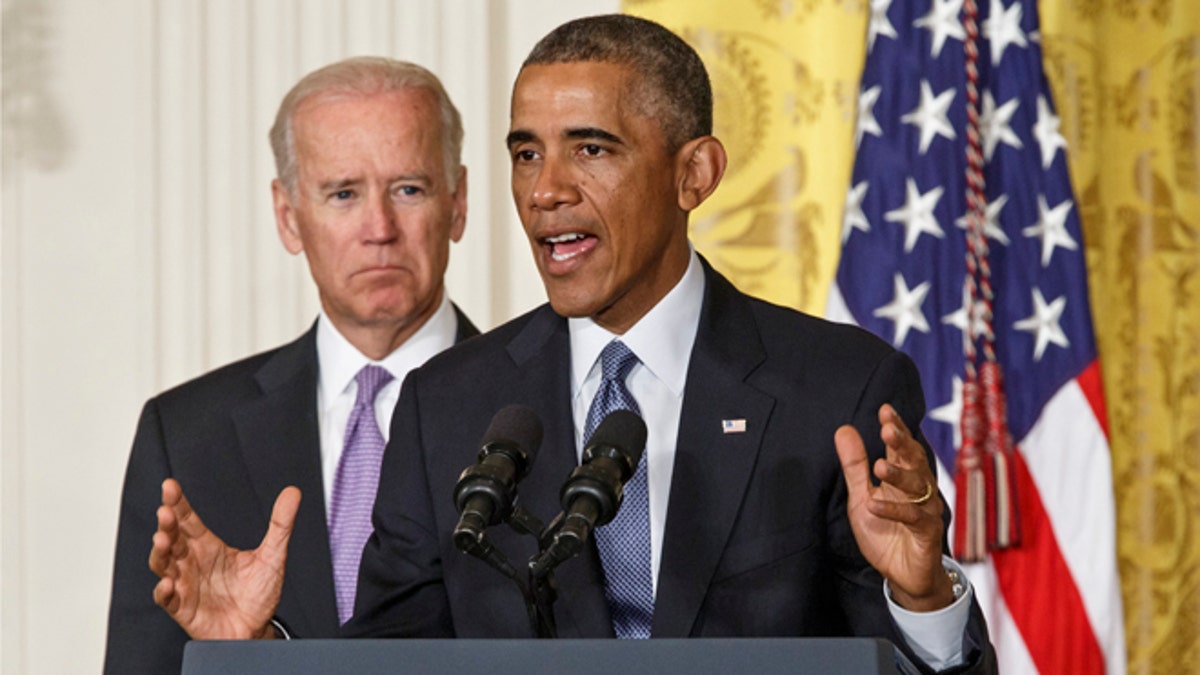
In this Friday, Sept. 19, 2014 photo, President Obama, with Vice President Biden, left, outlines the 'It's On Us' campaign to help colleges and universities to prevent and respond to sexual assault on campus, at the White House in Washington. (AP)
President Obama, Vice President Biden and other top administration officials reportedly plan to boycott colleges and universities they think are not responding properly to sexual assault allegations.
The decision marks a sharp escalation in the Obama administration's campaign to pressure colleges on the issue.
The Washington Post first reported over the weekend that Obama, Biden, and members of the Cabinet will no longer visit these campuses. The White House confirmed to FoxNews.com that how colleges handle sexual-assault allegations will be a factor in potential visits.
"We look at a number of factors when making decisions about colleges and universities for potential visits, including how that institution handles the issue of campus sexual assault," a White House spokesperson said in an email. "It is one of many factors we have looked at for quite some time."
Still, many details of the apparent boycott remain murky. It is unclear what specific criteria, for instance, the White House will use to determine which colleges and universities will be on the visit blacklist.
But if those factors include which colleges are under review by the Department of Education, the list could be expansive. The Office of Civil Rights is currently investigating 253 incidents at 198 institutions.
Among them are esteemed schools like Dartmouth College and Stanford University.
Yet Obama visited Stanford as recently as June 24. University spokeswoman Lisa Lapin told FoxNews.com that Stanford "has worked very closely with the White House and supported the White House efforts around sexual assault over a number of years."
The president’s scrutiny of colleges could carry a personal element as well. As announced in May, older daughter Malia Obama already has made her college choice – set to attend Harvard in 2017, after a gap year – but younger daughter Sasha will be next up in the college search.
Meanwhile, boycotting campuses isn't the only measure the administration is considering. Vice President Biden suggested in an interview that federal funding should be pulled from schools the administration deems to be handling allegations poorly.
The criteria for such a decision also has not been announced. However, current laws surrounding sexual assaults at colleges are rooted in Title IX of the Education Amendments of 1972, which prohibits discrimination on the basis of sex at schools that receive federal aid, and the Violence Against Women Act of 1994, which requires that universities have procedures in place to respond to matters of sexual misconduct.
Institutions listed on the Department of Education’s site as under review are being investigated for violations of Title IX.
United Educators, a firm that provides risk-management services to over 1,000 schools, found that reported sexual assault claims among their clients had been decreasing until the Office of Civil Rights’ letter. In 2013, there were more reported claims than the last two years combined.
The management firm attributed the increase to “more institutions publicizing their policies and heightened campus awareness of sexual assault.”
The administration may have played a role in that. The current DOE investigation coincides with the public awareness education campaign, “It’s On Us.”
But even as the administration goes a step further and threatens to de-fund and now avoid certain campuses, the stats may be incomplete.
According to the National Sexual Violence Resource Center, as of 2014, more than 90 percent of sexual assault victims on college campuses do not report the assault, though one in five women and one in 16 men experience sexual assault in college.
Dartmouth spokeswoman Diana Lawrence expressed concern about those who do not report sexual assault when it does happen. “At Dartmouth, we want to see the number of reported incidents go up and the prevalence of incidents go down … Although the growing climate of reporting is encouraging, even one sexual assault is too many,” she said.
Still, there are concerns about enforcement going too far. Sen. Lamar Alexander, R-Tenn., and Sen. James Lankford, R-Okla., have criticized the Department of Education and the adminstration for imposing new requirements through the guise of providing guidance.
Additionally, there have been concerns from students and schools that in the administration's haste to stop sexual assault on campuses, it is infringing on the rights of the accused. The Associated Press reported that over 75 men have sued their schools since 2013, claiming reverse discrimination and unfair disciplinary processes.











































